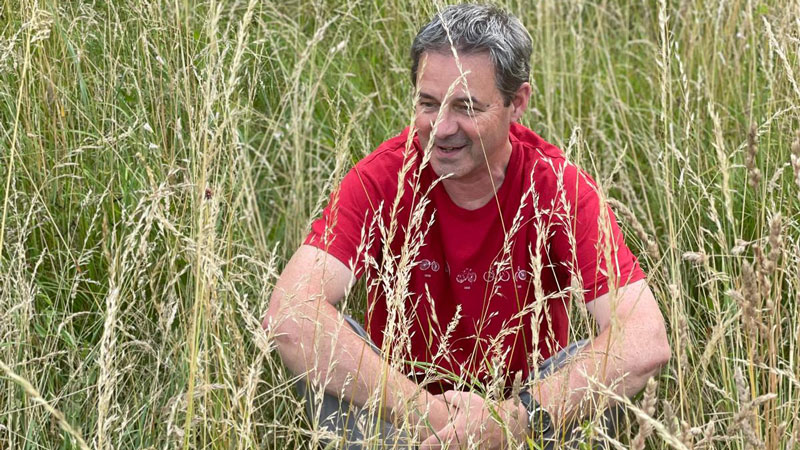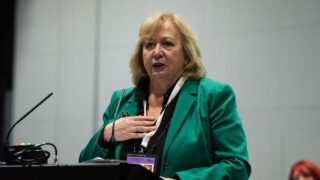UNISON is firing on all (fossil-free) cylinders in preparation for the United Nations Conference of the Parties on Climate Change, or COP26, in Glasgow between 1-12 November. And the message the union has for the world leaders gathering for the conference is that the time for talking is over.
As NEC member and leading UNISON green activist Stephen Smellie puts it: “Our aim is to focus the minds of the world leaders on the fact that the people are demanding genuine action – and action now.
“One of the criticisms of The Paris Agreement [in 2015] was that it committed governments to keep global warming below 1.5 degrees above pre-industrial levels, but it was all about achieving that in the future. We’re saying you need to do it now. There’s very little time left – all the reports are that you’ve got 10 years to get this right, and if you don’t put the policies in place now there will be catastrophic consequences.”
Those policies involve an immediate just transition to carbon-free economies that will stave off global warming, save the planet, protect workers’ jobs and create new ones for the years ahead.
COP26 is not just a meeting of heads of government, but a gathering of activists and campaigners from around the world. There will be major demonstrations outside the event, but also lobbying potential inside the halls, for unions, via the International Trade Union Confederation.
UNISON’s plan is to ensure that its members’ voices are heard loud and clear, not least in making the case for the continuing importance of public sector jobs in achieving and maintaining a carbon-free economy. Noting the union’s increasingly strong green agenda, and the work it already has in place, Stephen says: “We’re really in a position to try to influence this.”
UNISON’s activity leading up to and during COP26
- UNISON Green Week, 18-26 September. The union will encourage branches to hold climate emergency meetings, invite guest speakers and volunteer for green activities
- A UNISON green webinar, promoting COP26 activity and examples of what branches and regions are doing;
- Global Fridays for Future events on Friday 5 November, with school/college strikes being planned internationally. UNISON will call for solidarity and supportive (non strike) actions from unions and workplaces;
- Global Day of Action on Saturday 6 November. Demonstrations will take place in Glasgow and London – where UNISON will join with trade union blocs – as well as other major UK cities;
- A People’s Summit on 7-9 November, streamed so that members can watch and participate in debate without going to Glasgow.
The most important UNISON contribution during this period will be the launch in Glasgow of the union’s Greening Public Services report. General secretary Christina McAnea will present the report on 8 November – in the middle of the climate conference.
At its heart will be a devolved review of governments’ green funding commitments against existing spending estimates in public services and the actual spend needed to reach net zero in public service delivery by 2050.
The report will also provide ‘models of green transformation’ that will benefit services, protect jobs, promote re-skilling and training of current jobs, and provide new green roles.
Says Stephen: “The public sector is a huge user of carbon – you can’t run the health service without using up lots of energy, or schools, for example. So how do we decarbonise the public sector? It’s a big question, and unless we have answers to that we won’t be able to move forward.
“So, we’ve commissioned research into ideas on how we decarbonise. What do we need to do for hospitals and local authorities to reach zero carbon? We can discuss on a local level how we heat buildings better, and so on and so forth, but we need a bigger plan.”
UNISON’s growing Green Network now numbers around 380 branch green reps and activists, who are raising awareness of climate issues within the union as well as lobbying their employers to think hard about the carbon footprints of their organisations.

Stephen (pictured above) has his own experience of how the green commitment of trade union members can have an incredible influence.
The deputy convenor for UNISON Scotland, he also chairs the union’s Green Network in Scotland, open to any members with an interest in green issues, which in its four years has explored ideas that have fed into branch motions to national delegate conference.
At the same time, he helped to initiate discussion on climate and just transition within the Scottish TUC, which led to the Just Transition Partnership between the STUC, Friends of the Earth, individual unions and others, in turn leading to pressure on the Scottish government to set up the Just Transition Commission – which gave its report this March.
The commission’s call to action includes “an orderly, managed transition to net-zero that creates benefits and opportunities for people across Scotland”, with the provision of the skills and education that people will need to benefit from the transition.
The report also acknowledges the failure to involve local industries in the proliferation of wind turbine projects in Scotland – building overseas when Scottish shipyards could have done the job.
Stephen says: “The Scottish parliament passed legislation about climate change much earlier than most. The point we made was, ‘That’s fine, but you need a just transition, you need an economic industrial policy’. The commission didn’t go as far as we would have wanted, but generally speaking it’s good, and it’s way ahead of what the UK government has done.
“So we contributed to Scotland’s agenda,” he adds proudly. “That came directly from work coming through UNISON.”
The same journey must now apply on the global stage of COP26 – moving from the commitment to just transition in Paris to industrial policies that will actually deliver it, he says. “That’s about what kind of jobs do we need, what kind of training do we need, what kind of skills do we need.”
Meanwhile, locally, UNISON still has much to do and its green reps are key – engaging with members, having them think about their individual jobs and how they might do them in a more environmentally friendly way, slowly bringing green awareness into the mainstream of the union’s bargaining work with employers.
“We need to be able to to go to employers and say, ‘Actually we can do this differently – and it would be better.’ Our negotiators’ focus is on pay, terms and conditions, for obvious reasons. But they can also use their skills to sit down with employers and negotiate for a greener workplace and a greener future.”
Rob Nicolson is one of UNISON’s growing band of green reps, newly in the role for the NHS Glasgow Clyde and CVS branch. And he’s raring to go.

Aged 25, Rob joined the NHS when he was 18, working first in Fife and currently as a ward clerk for the renal transplant unit at Queen Elizabeth University Hospital in Glasgow. He was young members’ officer in Fife before continuing the same role in Glasgow – to which he’s added green rep for good measure.
“I’ve always had an interest in the environment, for as long as I’ve known about the issues,” he says. Friends of the Earth and the Green Party were early influences, along with a certain Swedish schoolgirl.
“Greta Thunberg is a big part of it. Having the courage to just stand up and say, ‘Nope, this is bad, you need to stop this’. And when she was speaking at the big events, speaking to the world leaders themselves – that took some nerve. Yeah, she’s very inspiring.”
Given that green rep is a comparatively new position in the union, Rob is finding that “there aren’t really any set boundaries for it” and that one of his chief tasks is to find a focus that works for his branch. And he thinks he’s found one.
This June, a number of Glasgow’s leading employers and businesses signed the Sustainable Glasgow Charter, with an ambitious commitment to accelerate the reduction of their carbon emissions so as to help achieve net zero in the city by 2030.
“It’s really exciting. Every organisation or enterprise has to analyse their carbon footprint and their impact, through three scopes – energy they generate and burn, energy they buy, and waste management. They have to make regular reports on their impact, their action plans, and they have to continually review it.
“So, the union can be a part of that. It’s a really good opportunity, because they’ve got COP26 in Glasgow, Glasgow City Council has signed it, the NHS has signed it, so many big names have admitted there’s an issue, but I think it’s up to green reps like myself to try and ensure that the organisations don’t just turn it into some sort of self publicity, to keep them honest.”
Rob recently took part in one of the online courses on green issues that UNISON Scotland has been offering through the Union Learning Fund. “It was really good, really informative. Climate change can be so overwhelming, but the facilitator asked questions around different ways that we can look at it, and we had some interesting conversations about government regulation, how do you incentivise people, how we’re sourcing things, housing, things like that.
“What’s scary is that there is a perspective shift, from all these things that could happen to all these things that are happening right now – like the floods in Germany and Belgium. It’s real.
“We get all these false promises from people in power. They say they prioritise it, but they never do. But this thing in the distance is getting closer and closer and closer.”

Images: Bigstock







One thought on “Time’s up for the climate crisis”